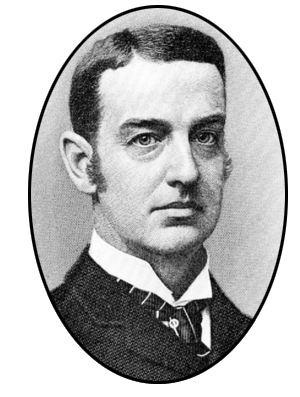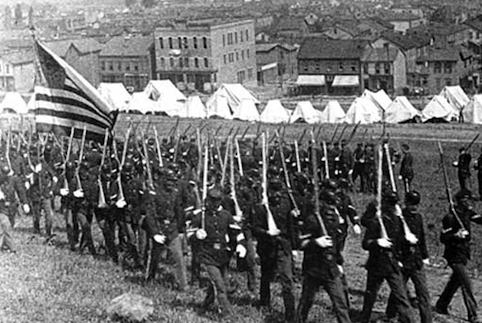[The following is Episode 13 of my 16-part documentary series entitled Larger than Life, about the role that beliefs play in shaping the events of our civilization.]
He
had come to the United
States in 1848, when he was a boy, only
twelve years of age, with only five years of schooling. His father, a weaver, had left their native Scotland , with
his family, after the widespread use of a new invention, the power loom, had
robbed weavers of their profession. They
settled in Pennsylvania ,
poor and destitute, staking their future on the promise of a new life in a new
land. The boy would never return to
school. He found immediate employment at
a mill, where he earned $2 a week, and his dedication to his work brought him
rapid advancement. A year later, he was
working as a clerk at a telegraph office, and his penchant for rapidly memorizing
faces and addresses, to speed up delivery of messages, led to even more
success, including wage increases which raised his salary to $20 a month. He learned Morse code, and found a new career
as a telegraph operator, and in 1856 made his first investment, purchasing ten
shares of stock in a message and freight delivery service. Two years later, he invested in the new
invention of sleeping cars for railroads, and exclaimed, after reaping a
substantial return, “Blessed be the man who invented sleep.” In 1859, at the age of twenty-four, he was
made superintendent of the Pittsburgh division
of the Pennsylvania railroad, and two years
later, was investing in oil fields in Pennsylvania . By 1865, he was at the head of a
bridge-building company, as well as an iron company, both of which he had
formed in partnership with friends.
Profiting from a high demand for iron after the end of the American
Civil War, as well as innovations in production and sales implemented by his
employees, his fortunes continued to grow.
It was with some reluctance that he expanded his operations into the
making of steel, complaining that it took more time and was costlier to
manufacture than iron, but it was in steel that he would find his greatest and
most enduring successes. And, in 1901,
when he finally sold his steel empire and retired, it would be for the sum of
250 million dollars. From his humble
beginnings as an impoverished, poorly educated Scottish immigrant to his
phenomenal rise as a captain of industry, Andrew Carnegie would come to
symbolize the awesome, transforming power of the industrial revolution, as well
as the titanic, unforgiving power of America ’s robber barons.
The industrial revolution was like
none other in human history. It was not
a rebellion of peoples, not a political or social upheaval like the American
and French Revolutions. But its outcome
would fundamentally change the lives of individuals at all levels of society,
would radically transform the balance of power among nations, and would force
philosophers, theologians, and scientists to rethink the role of man’s place in
the world, and civilization’s ultimate destiny.
Like other revolutions, it had been brought on by a number of distinct
causes, which collectively prepared the way for a sweeping change or
upheaval. One of the most important had
been the Crusades, during the Middle Ages, when Christian armies fought to
regain the Holy Land from the Muslims. While the Crusades had ultimately failed,
they had opened new avenues for trade between the peoples of Europe and the Middle East . The
general growth of trade, in turn, had given the merchant a greater role in
society, had promoted the growth of a money economy, and had paved the way for
the downfall of feudalism. Another
cause, which also promoted the growth of trade, had been the age of
exploration. The travels of Marco Polo
in China had brought West
and East together, while the exploits of Christopher Columbus and other
Portuguese and Spanish Explorers introduced Europe to the New
World . The Renaissance,
which began in Italy Britain
It was in
But when the industrial revolution
came to the United States of
America America
 |
| Cornelius Vanderbilt |
One of the earliest incarnations of
this new breed of American titan was Cornelius Vanderbilt. Born in Staten Island ,
New York in 1794, he embarked on his career at
the age of 16, when he created a ferry service to shuttle passengers and
freight between Staten Island and Manhattan New York to Chicago Richford , New York Cleveland America

John Davison Rockefeller
Although Andrew Carnegie, who came
to this country as an impoverished immigrant from Scotland

Andrew Carnegie
Carnegie’s empire would reach its
pinnacle through the efforts of another man who would loom large in his legend,
Charles M. Schwab. Schwab had also had
humble beginnings – in fact, as a youth, he had once tended Carnegie’s
horses. But in 1881, he was working in
one of Carnegie’s companies as an engineer’s assistant, and by 1892 had risen
to the rank of general superintendent at the Carnegie steel plant in Homestead , Pennsylvania New York America United States
 |
| John Pierpont Morgan |
In addition to the steel industry
that he created, and his substantial charitable contributions, Carnegie left
one other, remarkable legacy. It began
with a visit from a young law student, who had found a job to support himself
through school by writing articles for a magazine on the rich and successful in
America
The young writer, Napoleon Hill,
accepted the challenge. For the next
twenty years, he interviewed many of Carnegie’s peers in business, such as
Henry Ford, Charles Schwab, Harvey Firestone, and John D. Rockefeller, along
with great inventors such as Thomas Edison and Alexander Graham Bell, and the
American presidents Theodore Roosevelt, Woodrow Wilson, and William Howard
Taft. The philosophy that came out of
these endeavors has appeared and reappeared in books on personal development
and business success for nearly seventy years since the publication of Napoleon
Hill’s most influential book, Think and Grow Rich, and they have become
the staple of career counselors, success gurus, and motivational speakers to
this day. At the core of Napoleon Hill’s
success philosophy was a simple but powerful idea, that a person’s thoughts and
beliefs have a pervading influence, not just over the circumstances of his own
life, but over those of his fellow human beings, in ways that he cannot
conceive or imagine. Hence, to succeed,
one must have a clear objective and purpose, and a passion for obtaining that
objective which includes a willingness to sacrifice for it, along with a belief
that its attainment is possible. But the
power of an individual’s thoughts, Napoleon Hill contended, is multiplied many
times over when it is joined in a cooperative alliance with those of others who
work in a spirit of harmony to attain mutually desired goals. And, beyond this, there is an even greater
power, that Hill referred to as Infinite Intelligence, a type of universal
storehouse of Divine power and knowledge, which is available to all who develop
the capacity to open their minds to its influence. This philosophy, with its emphasis on
personal initiative, and teamwork, coupled with a reverential if somewhat
pragmatic acknowledgement of a higher power, had a modern, but distinctly
American, cast. In a world where the
science of evolution was challenging religious faith in the traditional ideas
of Creationism and Christian altruism, a recipe for success, for making oneself
a survivor in an increasingly competitive world, seemed to be a direct answer
to the prayer of modern man. But the
success philosophy of which this recipe was a part appealed to principles
characteristic of the classic American Protestant ethic, which extolled the
virtues of self-reliance and hard work.
It embodied the American dream, in which anybody could become a success,
if only he made himself worthy of it. And
yet, in spite of its emphasis on personal power and material reward, it still
made way for a higher power, although now this higher power was not some
supreme moral agent or lawgiver, but a power in a distinctly modern sense, a
source of energy and inspiration for those who knew how to utilize it.
But there was a dark side to this
new culture of ambition, symbolized by the nineteenth century American
tycoons. For in spite of their reliance
on invention, on new technologies, and on capital, a critical component in
their success continued to be labor. But
the modern laborer, consigned to working in the new factory system, often found
that he had little more rights and privileges than the ancient serf. In theory, he could negotiate his wages,
based upon the tried and true principles of supply and demand. In practice, however, he was often a hostage to
whatever particular industry dominated his local community, forced to work for
the wages that it offered, because there was no viable alternative. His only recourse was unionization, and
collective bargaining, a system that was viewed as pernicious and subversive by
the capitalists who ran his factories.

Carnegie was no exception, although
in public pronouncements he professed to support the right of his laborers to
organize. In an essay that he wrote in
1866, he said, “The right of working men to combine and to form trade unions is
no less sacred than the right of the manufacturer to enter into associations
and conferences with his fellows. . . . My experience has been that trade
unions upon the whole are beneficial both to labor and to capital.” But his actions provided a stark contrast to
his words. In the very next year, when
iron workers held a strike at one of his plants in Pittsburgh, he brought in foreign
workers to take their place, and in 1884, he used strikebreakers at a mill in
Beaver Falls, Pennsylvania, as he did over the next three years at the same
plant. But the most memorable conflict
with union workers occurred at his steel mills in Homestead , Pennsylvania

Henry Clay Frick
 |
| Pennsylvania State Militia Marching to the Homestead Strike |
But Carnegie, too, had paid a price
for his role in the Homestead Atlantic . Shortly after the strike, The St. Louis
Dispatch wrote: “Three months ago Andrew Carnegie was a man to be envied. Today his is an object of mingled pity and
contempt. . . . Ten thousand ‘Carnegie Public Libraries’ would not compensate
the country for the direct and indirect evils resulting from the Homestead
Lockout.” The saga of Homestead Homestead ,
Pennsylvania , Flint ,
Michigan , and Gary , Indiana

The

Political Cartoon Featuring Teddy Roosevelt
The age of industrialism, in America Darwin Europe ,
at the dawn of the twentieth century, social Darwinism would take an even
darker turn. Here, in the writings of
radical intellectuals, the superman would have not only an indomitable personal
freedom, stronger spirit, and contempt for the weak, but also a racial
pedigree. As the promise of the new
century began to fail, betrayed by a devastating, pointless world war, many
would embrace this darker ideal of the superman, as part of a desperate attempt
to restore a sense of personal pride, in the face of a hostile world that had
lost its bearings. Others would find a
sense of purpose in equally hollow ideologies.
And at the heads of these were false prophets, demagogues, and tyrants,
who would eclipse, in their tyrannies, the greedy acts of any American robber
baron, and who would leave in their wake a toll of oppression, murder, and
destruction unrivalled by any other age in human history.